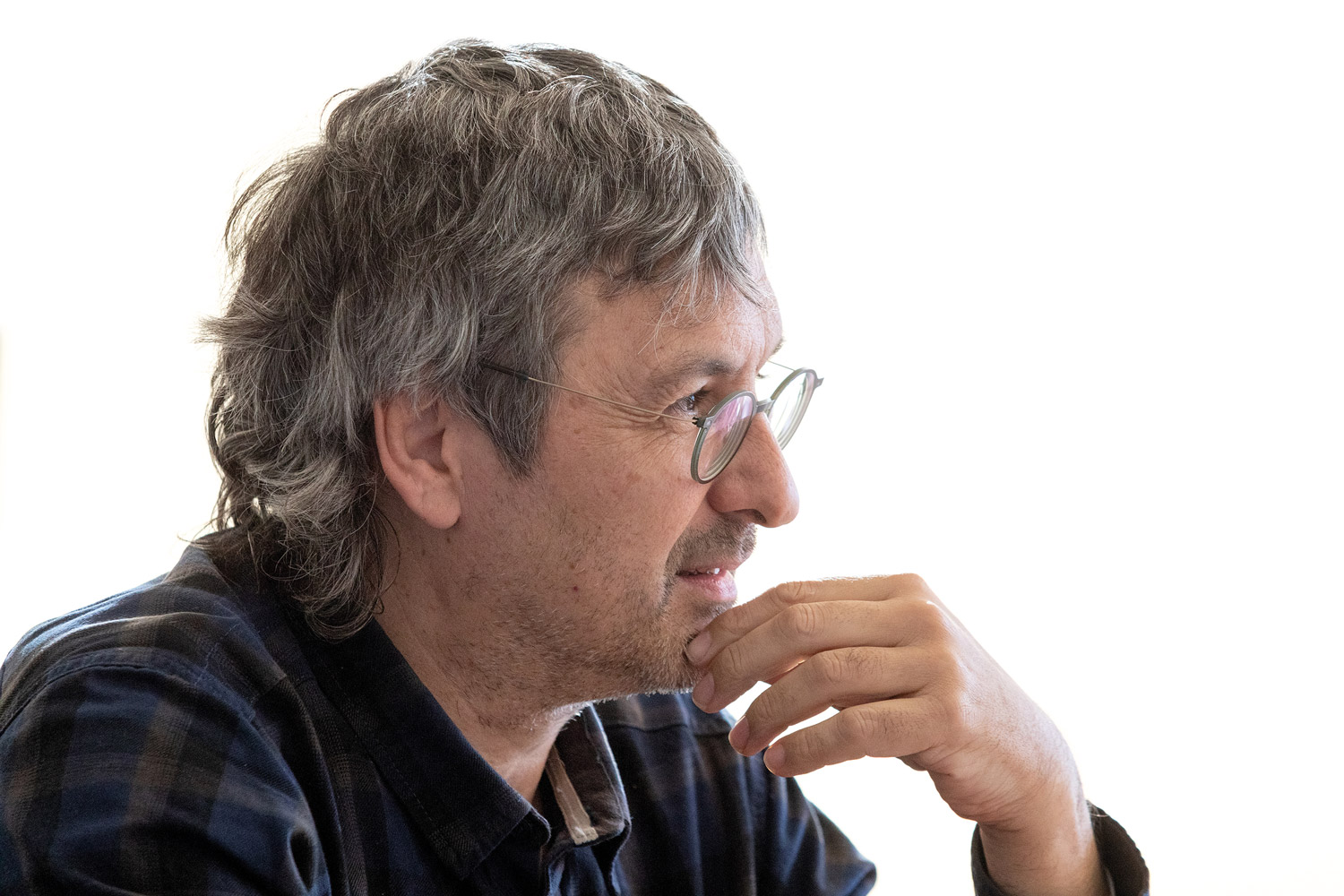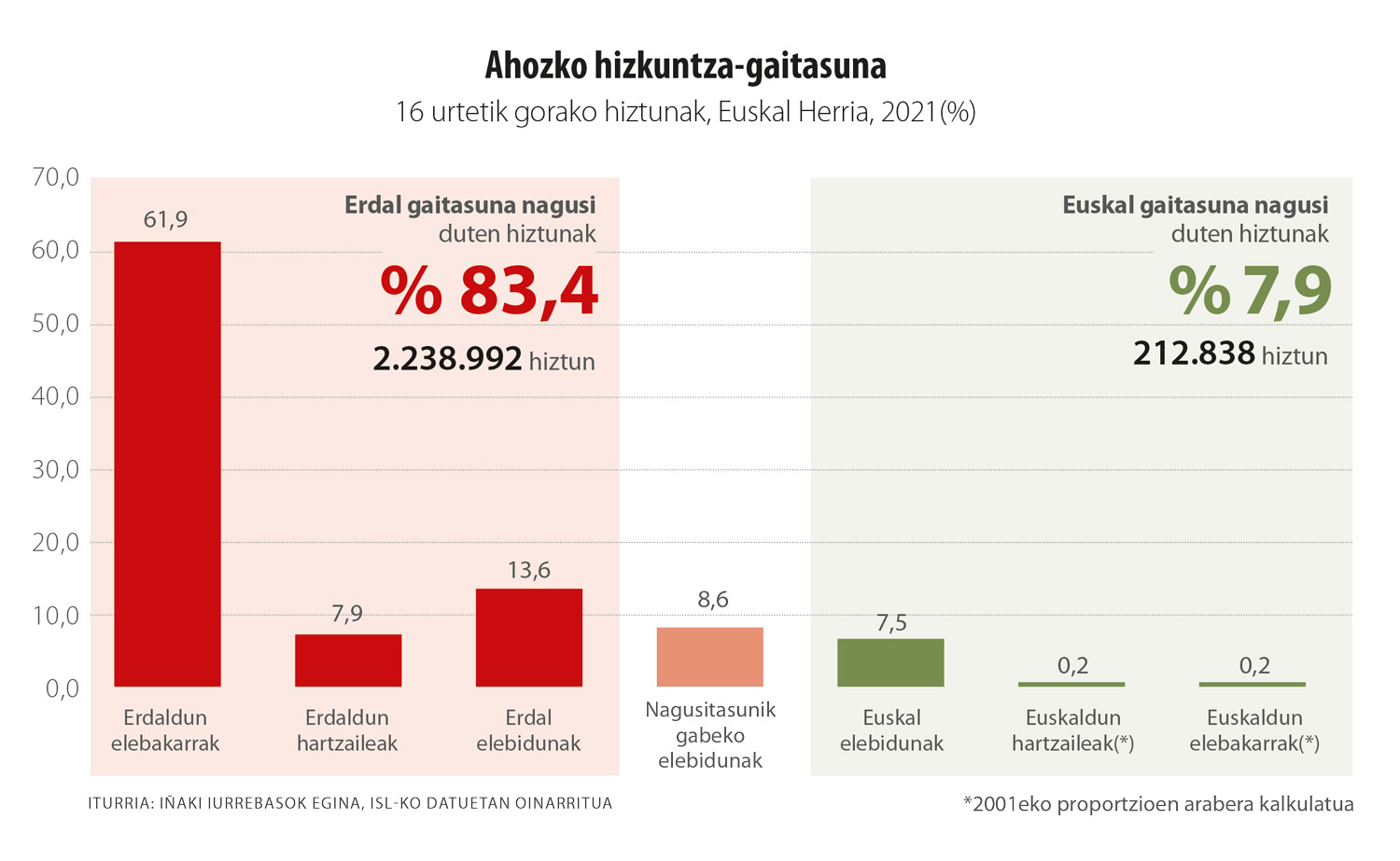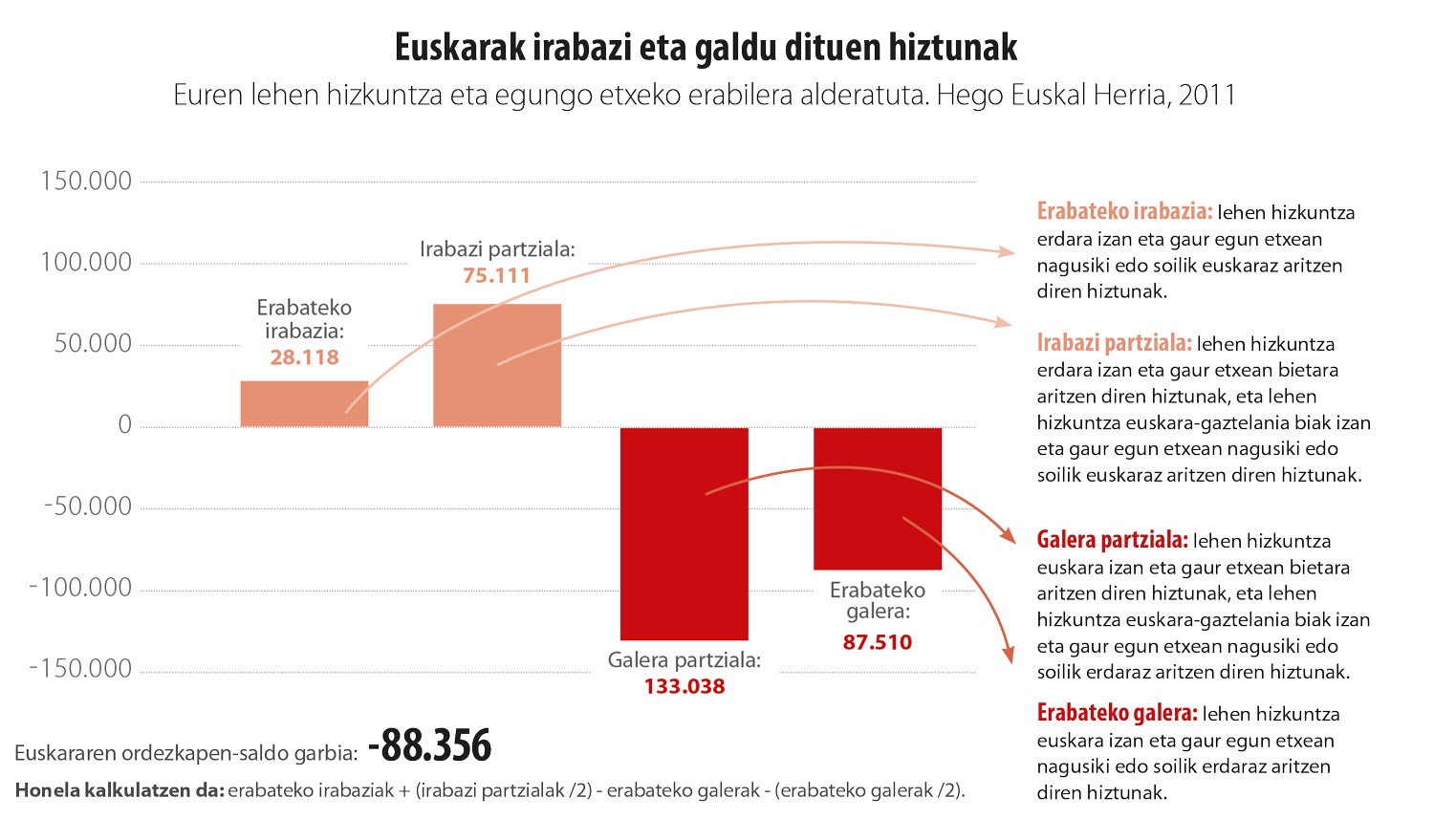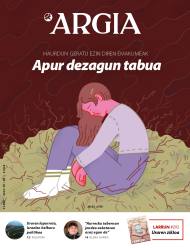In red minding
- The sociologist Iñaki Iurrebaso Biteri has published this opinion article on the web Telesforo Monzon elab. Iurrebaso states that Euskera is closer to death than to a situation of normalization. It indicates that the situation requires an awareness of the seriousness of the situation and the implementation of courageous language policies.

In order to think and implement an effective language policy, it is necessary to set the objectives properly and to do so to be clear about the starting point.
Two thirds of the twentieth century were particularly violent in the Basque minority process. During the Francoist era, the fate of the Vasco-speaking community was particularly stressed: it was already on its way to extinction. Fortunately, there was a change of trend around the 1960s, a process of regeneration was initiated that partially stopped and turned. Today, however, we still suffer from an extreme minority situation. The difference between the languages we have in our territory is great, to the detriment of the Basque country. This imbalance is evident in the use of language, in which only one is made for every seven interviews in Spanish/French. The situation is no better in terms of language proficiency: only 8% of speakers are easier to perform in Basque than in Spanish/French, while 83% of speakers are more easily conducted in one of these two languages. Not only that. A large majority of them are monolingual and speak exclusively in Spanish. There is, therefore, a great imbalance between Spanish and euskera.La photography
is completed with two fundamental aspects: the mastery of the different languages in the territory and the processes of linguistic evolution. Considering the predominance of languages in the territory, Spanish/French has an almost absolute hegemony. There are still some municipalities and neighborhoods where Euskera is socially hegemonic, respiratory zones. In their daily lives, Euskera predominates and their socio-linguistic processes, unlike the rest of the territories, encourage the strengthening of Euskera in local speakers. However, these spaces have little demographic weight, only 4% of the population currently live and have been weakening in recent years. If the trend of the last twenty years persists, in a few decades the geographical areas dominated by Euskera would disappear.

Linguistic evolution processes analyze the linguistic changes that occur throughout the lives of speakers. If we analyze how these processes occur in the Basque Country, it must be said that these processes have an impact in the sense of reinforcing today in half. The tendency towards Euskaldunization of Basque speakers is greater than that of Euskaldunization of Spanish-speaking/French speakers. This phenomenon is a consequence of the Basque country's great weakness in capacity, use and territorial superiority, a direct reflection of the vital weakness of our linguistic community. We must not forget, moreover, that the general contexts make Spanish-French necessary/indispensable for life and unnecessary/secondary. The context therefore helps the dominant language to increase this primacy to the detriment of the minority language.
However, the Basque community has some strengths that support it. The majority of the population expresses their commitment to the Basque Country and uses it more than expected. Thus, the best speakers in Basque are faithful to the language; and the bilinguals who develop better in Spanish use Basque more than the comfort criteria would require. We also have strengths in the conducts related to the processes of socialization and transmission. Thanks to them, the new generations are now more Euskaldunes in capacity and use than their parents, although the hegemony of Castilian remains clear among the new generations. The vasquism of the broad sectors of the population and the effort of the community in the processes of socialization are, therefore, characteristic positive features. They are not common features among the majority of the world ' s minority linguistic communities and are undoubtedly essential elements for a recovery process.

Having said that, we can summarise the situation with two characteristics. First characteristic: all the factual variables show a situation of red minority for the Basque people. It is a great imbalance between Castilian and Euskera, which is very vulnerable both in the use of Castilian and in competition, in territorial superiority, in linguistic evolution and in socialization processes. In brutal terms, the numbers for these variables show that we are closer to the death of the tongue than to a normalization situation. Moreover, we are closer to death than to a possible situation of balanced bilingualism. This seriousness of the situation also leads to the tendency to continue to “undermine minority languages” in itself, at least if a strong activity for minority languages is not implemented in the opposite direction.
The second fundamental characteristic is that, in contrast to the previous one, we find a strong favorable attitude towards the Basque among the speakers, a community with
a great desire for life. This enthusiasm has materialized not only in the opinions, but also in the behaviors of the speakers in the last 50-60 years, from the hand of the great wave of Euskaldunization that started in the 1960s, driven by the impulse of Euskaltzale and nationalism. Without the effort of the individual Euskaldunes and Euskaltzales that have participated in that great wave, without taking into account the impulse and action of the organized Basque culture, if they had not been policies in favor of the Basque from some institutions, the process of reduction would have followed clearly and forcefully, the set of Castilian monolinguistics would have increased and the Basque processes would have decreased even more weight, etc. The community has kept alive the great effort that has been made because of this great life, taking significant steps in some aspects and in others against trends adversas.En this context, the Basque community is still alive, with simultaneous contradictory tendencies that drive strengthening and weakening, while at the same time there have
been dynamics of substitution to the detriment of the Basque country and of continuity and recovery of the language. In particular, over the past twenty years, data show that the recovery momentum started in 1960 has weakened and has been introduced in a period of stagnation. This has influenced, among others, the strong economic, technological, social and cultural changes in the globalized world and the changes in the demography of the Basque Country, in the flows of birth and migration. It is assumed that these trends may increase in the future.
In this sense, the minority situation we live in requires, firstly, awareness of the gravity of the situation and, secondly, the implementation of strong and courageous linguistic policies in favour of the Basque country. Bringing the Basque to priorities and working on tailor-made language policies will be a fundamental task in the coming decades, if we do not want the chain of centuries to be interrupted.
Interview with Iñaki Iurrebaso in Larrun magazine: "The speakers don't turn their backs on the Basque."
Doctoral thesis by Iñaki Iurrebaso
Nola ezar euskara, gal-bidean, ahal-bidean eta zabal-bidean? Galdera horri ihardukitzen entseatuko da Mattin Irigoien Zabalik elkarteko kidea, ostegun honetan eskainiko duen mintzaldian.
“More and more in favor.” Euskaltzaleen Topagunea presented a document entitled this last April in Pamplona.
The concern for the removal of an important part of the society of the country from positive attitudes towards Euskera among the people who speak Basque in Navarre... [+]















